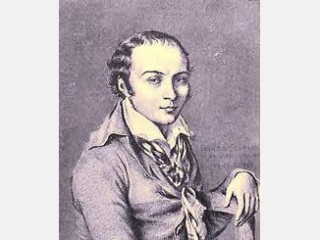
Andre Chenier biography
Date of birth : 1762-10-30
Date of death : 1794-07-25
Birthplace : Constantinople, Greece
Nationality : French
Category : Famous Figures
Last modified : 2010-11-29
Credited as : Poet, poems: La Liberté, Jeune Tarantine
The French poet André Marie Chénier compressed into his brief life many kinds of experience and many poetic forms. He emerges in history as a rare poet-hero whose life is exemplary and tragic.
André Chénier was born in Constantinople. His father was French, and his mother claimed to be of Greek origin. André's early sense of affinity for Greece was vital in his development as a poet. He spent most of his childhood with an aunt and uncle in Carcassonne in Languedoc. When he was 11, he rejoined his mother in Paris and was exposed to the flamboyant society of her salon.
Chénier was an excellent scholar at the exclusive Collége Navarre. His earliest works are adaptations of Homer and Virgil and poems of adolescent love. He was always an affectionate and ardent man; he had many mistresses and a few great loves but never married.
In 1794 Chénier was arrested more or less by accident in Versailles and was sent to Saint-Lazare prison with no formal charges against him, though he was suspect through association with moderate groups. Eventually, he was accused of being an accomplice in a fictitious prison conspiracy and, more seriously, of subversive writings. He was guillotined on July 25, 1794.
Chénier's writings were not published until 25 years after his death, at which time he became the model for the
romantic poets. Victor Hugo, Sainte-Beuve, Chateaubriand, Lamartine, and others nurtured the legend of the poet as hero which sprang up around Chénier's memory.
Chénier's Bucoliques, melancholy poems about love and sensual imaginings, were written in his late teens and early 20s. Later he wrote the erotic and witty Elégies as well as the Odes for his mistresses. His Idylles, which instinctively capture the beauty of Greek lyricism, include such famous poems as L'Aveugle, Le Mendiant, La Liberté, and the superb Jeune Tarantine.
Chénier's poetry is always vital and enthusiastic, since he believed that poetry must spring from genuine experience and lived emotions. The poet must be an inventor— yet Chénier's classical roots are always apparent. He borrowed not only from Homer and Virgil but from Racine, La Fontaine, Rousseau, and others.
During the Revolution, Chénier established himself as a great satirical poet. His poetry became a chronicle of the great events of the Revolution. Among the most outstanding poems are Les Autels de la peur, Ode q Versailles, Ode q Charlotte Corday, and La Fête de l'Ãtre Supreme. In prison, where he wrote his lambes and part of the Odes, Chénier withdrew into himself, yet did not fail to admire and to celebrate the courage of his fellow prisoners. The night before his execution Chénier wrote the last poem of lambes. In this noble work, half elegy and half satire, he rises from a sense of his own separateness and melancholy to real self-forgetfulness, compassion, and courage.
Two major works on Chénier are Francis Scarfe's scholarly André Chénier: His Life and Work, 1762-1794 (1965), which is devoted to close analysis of the poetry and to a study of poetic forms, rhetoric, and language; and Vernon Loggins, André Chénier: His Life, Death and Glory (1965), a more direct and simple, if adulatory, account of the poet's life, with less detailed discussion of the poetry.
















